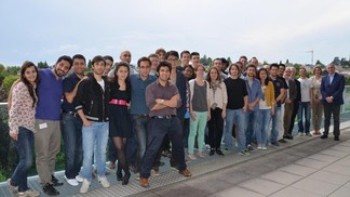Jul 16 2013
EPFL organized the first Integrated Energy Systems PhD School from May 27 to June 7, 2013, under the leadership of Prof. Mario Paolone from STI and within the framework of the EuroTech Universities Alliance. Its main objective is to address energy systems in an integrated perspective, so as to highlight the main challenges and provide methodological approaches to address multi-disciplinary energy-related problems.
 © 2013 EPFL
© 2013 EPFL
40 PhD students participated in the two-week course, which was organized as five main teaching modules, namely: energy storage, energy integration, energy conversion systems, energy control systems and energy in the built environment. The Integrated Laboratory of Performance-Integrated Design (LIPID) coordinated the effort of the last module and supervised a two-day mini-project on the demand-supply issue in residential buildings.
The course module relevant to energy in the built environment included four lectures. An introductory lecture entitled "Energy efficiency as a design factor for buildings" was given by Prof. Marilyne Andersen (LIPID), followed by Prof. Emmanuel Rey’s (LAST) on “Low Energy Building Design Outreach to Practice” and an overview of the main parameters in a building’s thermal balance by Parag Rastogi, PhD Candidate at LIPID. These presentations were followed by Dr. Munari Probst’s (LESO) on “Complementing building energy needs with targeted solar technologies” and, in the afternoon, Prof. Emmanuel Rey’s second lecture on “Low Energy Neighborhood Design Outreach to Practice” complemented by Dr. Jerome Kaempf’s (LESO) on “Energy management for sustainable urban design”.
As a follow up for the teaching module, students were asked to participate in a mini-project and assess solutions for meeting energy needs in residential buildings. Participants analyzed a case study housing unit in Lausanne and Davos during the winter and summer seasons and proposed sustainable solutions to achieve desirable indoor conditions. The final presentation showed the students’ responsiveness to the demand-supply problem and their capability to select and rank sustainable solutions within an integrated approach. The final project outcomes matched the PhD school learning goals. Overall, the EPFL-EuroTech PhD Summer School was evaluated very positively by the students, who asked for more hands-on sessions in the future.